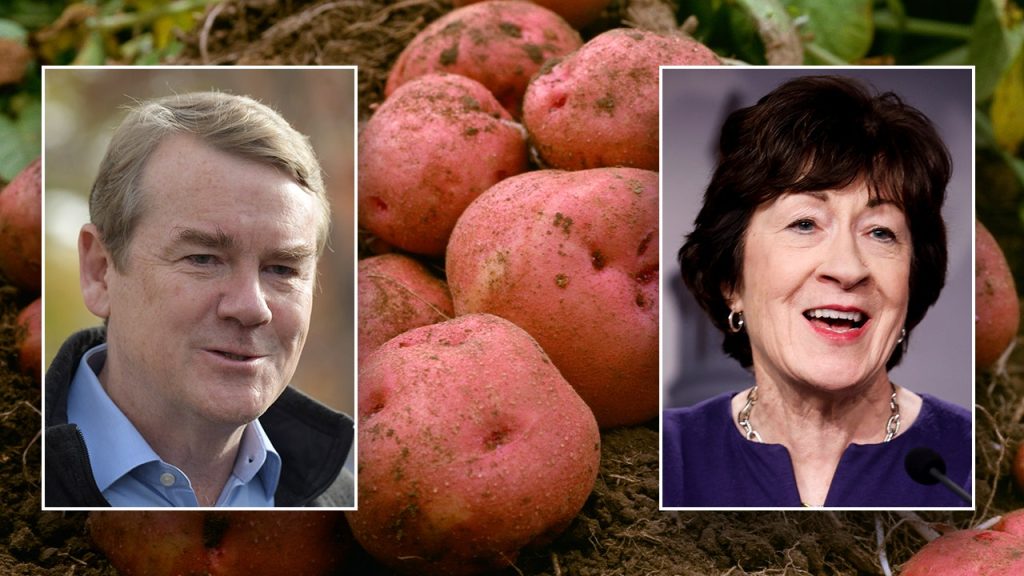A bipartisan effort in the U.S. Senate has successfully ensured that the USDA will continue to classify the potato as a vegetable in the Dietary Guidelines for Americans. Sen. Michael Bennet and Sen. Susan Collins wrote a letter opposing any reclassification of the potato as a grain, and their efforts have preserved the potato’s title. Secretary of Agriculture Thomas Vilsack personally called Sen. Collins to deliver the news of this decision, emphasizing the importance of maintaining the potato’s classification as a vegetable. The Senators believe that reclassifying potatoes as a grain would send a false message to the public about their nutritional value.
Sen. Collins believes that when prepared properly, potatoes are a nutritious, affordable, and versatile food. She shared her favorite way of preparing potatoes, which involves baking a stuffed Maine potato with cheddar cheese on top. The Mayo Clinic also recognizes the health benefits of potatoes, highlighting their high levels of vitamins, low calorie count, and fat-free content. Sen. Collins expressed satisfaction in hearing directly from Secretary Vilsack that the USDA has no intention of reclassifying potatoes and acknowledges them as a valuable vegetable.
The classification of potatoes as a vegetable was decided by the USDA, but a suggestion to reclassify them as a grain is still under consideration by DHHS Secretary Xavier Becerra. It remains unclear what decision DHHS will make regarding the potato’s classification. The Senators are urging DHHS to follow the USDA’s lead and recognize potatoes as a vegetable. The collaboration between the USDA and DHHS in setting the Dietary Guidelines for Americans highlights the importance of maintaining the potato’s status as a vegetable. Despite efforts to reclassify them, the support for potatoes as a vegetable remains strong.
The bipartisan effort to retain the potato’s classification as a vegetable in the Dietary Guidelines for Americans has been successful. Sen. Bennet and Sen. Collins’ opposition to reclassifying potatoes as grains has led to the USDA ensuring that they will remain classified as vegetables. Secretary Vilsack personally informed Sen. Collins of this decision, emphasizing the nutritional value and versatility of potatoes. The Senators and health experts believe that potatoes, when prepared properly, are a nutritious and beneficial food that should continue to be recognized as a vegetable.
The Mayo Clinic highlights the nutritional benefits of potatoes, including their high levels of vitamins and low calorie count. Sen. Collins shared her favorite way to prepare potatoes and emphasized their affordability, versatility, and nutritional value. Both the USDA and DHHS play a role in setting Dietary Guidelines for Americans, and the Senators are urging DHHS to follow the USDA’s lead in recognizing potatoes as a vegetable. The decision to preserve the potato’s status as a vegetable is seen as a win for public health and nutrition, supporting the message that potatoes are a valuable and healthy food option.
The decision to maintain the potato’s classification as a vegetable in the Dietary Guidelines for Americans underscores the importance of bipartisan efforts in supporting healthy food choices. Sen. Bennet and Sen. Collins’ letter opposing the reclassification of potatoes as grains has been successful in ensuring that potatoes will remain classified as vegetables. The recognition of potatoes as a nutritious, affordable, and versatile food is important in promoting healthy eating habits. The collaboration between the USDA and DHHS in setting dietary guidelines highlights the significance of preserving the potato’s status as a vegetable. Despite ongoing discussions about reclassifying potatoes, the support for them as a vegetable remains strong among Senators, health experts, and the public.













